Civil Enforcement FY 2022 Annual Results
EPA’s civil enforcement program continued its efforts to protect human health and the environment, particularly for residents in communities that are overburdened by pollution. To resolve noncompliance and attain environmental protection goals, EPA enforcement staff collaborate with the Department of Justice (DOJ) as well as tribal and state co-regulators. In FY 2022, EPA’s civil enforcement program achieved:
- Commitments to reduce, treat, or eliminate over 95 million pounds of pollution.
- Proper treatment, minimization, or disposal of over 100 million pounds of hazardous and non-hazardous waste.
- Commitments of over $4 billion to return facilities to compliance.
- Assessment of over $154 million in penalties.
- Conclusion of 72 judicial actions and continued oversight of nearly 500 judicial consent decrees.
Protecting human health and the environment in Indian country
EPA and federally-recognized Indian tribes work to protect health and the environment in Indian country. In FY 2022, EPA initiated compliance assurance and enforcement activities, including formal enforcement, to promote a return to compliance and to address violations in Indian country under multiple federal laws, including the Clean Water Act (CWA), the Clean Air Act (CAA), and the Safe Drinking Water Act (SDWA). For example,
- EPA Region 5 addressed significant noncompliance at six wastewater treatment facilities with National Pollutant Discharge Elimination System permits, resulting in cleaner water for residents.
- EPA Region 8 and DOJ finalized two settlements to address CAA violations at 52 oil and natural gas production facilities on state and tribal lands in the Uinta Basin, an ozone nonattainment area. The violations involved excess emissions of volatile organic compounds from storage vessels and their associated vapor control systems at the facilities, all of which are located within the Uinta Basin ozone nonattainment area. The settlements require the defendants to conduct injunctive relief at 246 of its facilities, pay about $700k in civil penalties, and perform over $1 million in mitigation projects.
- EPA Region 9 issued emergency orders under the SDWA to nine mobile home parks operating public water systems on the Torres Martinez Desert Cahuilla Indians Reservation to ensure that residents receive water safe to drink. Each SDWA order requires the system operators to provide alternative drinking water, reduce the levels of arsenic in the system’s water and monitor the water for contamination. In May 2022, EPA utilized American Rescue Plan funds to conduct a full suite of drinking water contaminant sampling at 18 public water systems located within the Reservation; sampling occurred at each system with an emergency order.
Each these enforcement actions support EPA’s National Compliance Initiatives.
Examples of FY 2022 significant civil enforcement achievements
Examples of FY 2022 significant civil enforcement achievements include the following cases:
Navistar, Inc.
On December 14, 2021, EPA and DOJ finalized a settlement with Navistar, Inc., an integrated manufacturer of trucks and diesel engines, for violations of the CAA, based on Navistar’s introduction into commerce of 7,749 heavy-duty diesel engines that were not covered by an EPA-issued certificate of conformity and that did not meet applicable emission standards. Navistar agreed to pay a $52 million civil penalty and mitigate at least 10,000 tons of oxides of nitrogen (NOx) to resolve violations of the CAA.
The settlement also requires Navistar to structure its mitigation of NOx emissions through one or more programs approved by EPA that will take into consideration geographic diversity and benefits to communities that are overburdened by air pollution.
More information: https://www.epa.gov/newsreleases/navistar-inc-reduce-10000-tons-nox-emissions-and-pay-52-million-civil-penalty-federal
Power Performance Enterprises, Inc (PPEI)
On May 2, 2022, EPA and DOJ finalized a settlement with PPEI and its owner, Kory Blaine Willis, one of the major players in the diesel defeat device industry, to resolve violations of the CAA. Between 2013 to 2018, PPEI and Willis manufactured and/or sold at least 59,125 electronic tunes or devices that disable filters, catalysts, and EGR systems and other critical emissions control devices equipped on diesel pickup trucks by the vehicle manufacturers in order to comply with the CAA emission standards. EPA estimates that these products may result in more than 100 million pounds of excess NOx emissions and 800,000 pounds of excess particulate matter emissions.
To resolve these violations, PPEI and Willis will pay a civil penalty of $1,550,000, will cease manufacturing and selling over 323 different products, cease providing technical support for its defeat device projects, destroy any remaining inventory, and comply with other injunctive relief requirements. PPEI and Willis also pled guilty to criminal charges in federal court for conspiracy to violate the CAA and to violating the CAA by tampering with the monitoring devices of emissions control systems of diesel trucks.
More information: https://www.epa.gov/enforcement/power-performance-enterprises-inc-and-kory-blaine-willis-clean-air-act-settlement
Chevron Phillips Chemical Company LP
On June 2, 2022, EPA finalized a settlement with Chevron Phillips Chemical Company LP to address violations of the CAA requirements at Chevron Phillips’s flares that resulted in excess emissions of pollutants, including volatile organic compounds, various hazardous air pollutants including benzene, and climate-change-causing greenhouse gases. Chevron has agreed to make upgrades and perform compliance measures estimated to cost $118 million to resolve allegations that it violated the Clean Air Act and state air pollution control laws at three petrochemical manufacturing facilities located in Cedar Bayou, Port Arthur, and Sweeney, Texas. Chevron Phillips will also pay a $3.4 million civil penalty. The settlement will eliminate thousands of tons of air pollution from flares.
More information: https://www.epa.gov/newsreleases/chevron-phillips-chemical-company-agrees-reduce-harmful-air-pollution-three-us
Austin Powder Company
On May 12, 2022, EPA and DOJ finalized a settlement with Austin Powder Company to
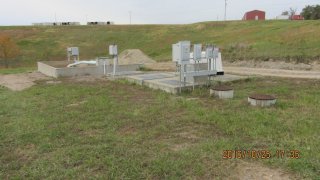
resolve CWA violations at its McArthur, Ohio facility. Austin Powder’s violations include:
- hundreds of discharges of pollutants in violation of its National Pollutant Discharge Elimination System (NPDES) permit effluent limits;
- failure to maintain and operate its wastewater treatment plants (WWTP) properly;
- failure to design, maintain, and implement an adequate stormwater pollution prevention plan;
- failure to comply with sampling requirements of the NPDES permit; and
- failure to comply with a 2018 Administrative Order on Consent.
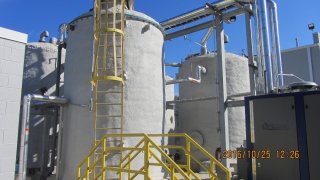
Austin Powder will
- install on-site septic systems to address the sanitary wastewater in the NPDES-permitted discharges;
- use an improved method for hauling the process wastewater for treatment off-site; and
- enhance its existing wastewater treatment plants to ensure discharges meet NPDES permit requirements.
This settlement also includes a civil penalty of $2.3 million and an estimated total pollutant reduction of 84,058 pounds per year.
More information: https://www.epa.gov/newsreleases/austin-powder-company-agrees-improve-wastewater-treatment-facilities-red-diamond-plant
Cleveland-Cliffs Steel LLC and Cleveland-Cliffs Burns Harbor LLC
On May 6, 2022, EPA finalized a settlement with Cleveland Cliffs Burns Harbor (CCBH) to resolve CWA NPDES violations, including several days of unpermitted releases of cyanide and ammonia nitrogen caused by a pump failure at the Indiana facility. EPA and the Indiana Department of Environmental Management emergency response
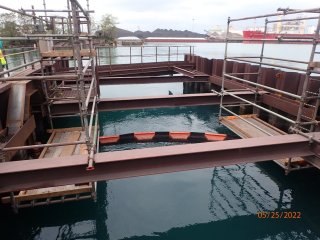
personnel responded to the releases. The cyanide release killed several thousand fish in the East Branch of the Little Calumet River and closed beaches in the Indiana Dunes National Park. CCBH also failed to provide timely notification and emergency reports to the local emergency response authorities after the release, as required by the Emergency Planning and Community Right-to-Know Act, and the Comprehensive Environmental Response, Compensation and Liability Act.
Under the settlement, CCBH will maintain a
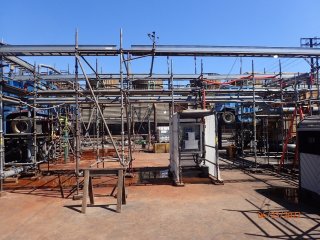
newly installed cyanide treatment system as well as maintain and operate a newly installed pilot ammonia-N treatment system until a permanent ammonia-N removal system is installed by May 2025. In addition, CCBH will use, on an emergency basis, an existing lined leachate storage pond to retain blast furnace air scrubber water in the event the Blast Furnace recycle system is disabled and the scrubber system needs to operate. CCBH must also pay a $3 million civil penalty.
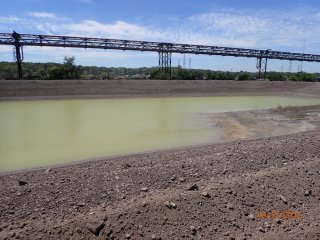
More information: https://www.epa.gov/enforcement/cleveland-cliffs-steel-llc-and-cleveland-cliffs-burns-harbor-llc-settlement
Benton Harbor
In fall 2021, EPA received a Petition for Emergency Action under the SDWA requesting that EPA investigate drinking water in Benton Harbor, Michigan. As part of EPA’s response to the petition, in November 2021, EPA issued a SDWA section 1414 Administrative Order outlining the steps the city must take to bring the drinking water system into compliance and ensure the water is safe for residents to drink. Work continues under the Administrative Order and broader EPA efforts, including ensuring filters, provided as a short-term remedy to the impacted residents, are effective at providing safe water in the interim. The State of Michigan has committed to provide free bottled water to residents until all lead service lines are replaced.
More information: https://www.epa.gov/mi/benton-harbor-drinking-water
Andersons Marathon
In August 2022, EPA finalized two coordinated settlements with The Andersons Marathon Holdings LLC (Andersons Marathon), resolving 131 Toxics Release Inventory (TRI) reporting violations of the Emergency Planning and Community Right-to-Know
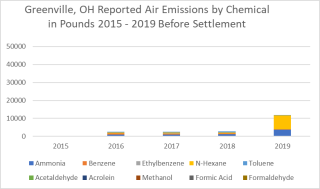
Act (EPCRA) at four facilities that manufacture ethanol in Indiana, Iowa, Michigan, and Ohio. Through close coordination of EPA’s Region 5 and Region 7 offices, these
settlements resulted in the correction of numerous TRI filing errors from reporting years 2015 – 2020; agreement as to how Andersons Marathon will report its future manufacture, process, or other use of fermentation chemicals; and adjusted measurements and releases of n-hexane and ammonia at its facilities.
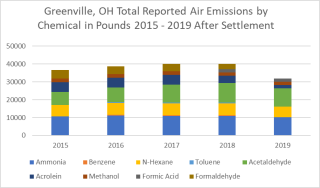
This settlement ensures the communities surrounding the four facilities have the best available information about chemicals at individual facilities, including their uses and releases into the environment. Andersons Marathon will also pay a $1.73 million civil penalty, the highest civil penalty to date for an EPCRA settlement.
More information: https://www.epa.gov/newsreleases/epa-reaches-17-million-settlement-over-alleged-toxics-release-inventory-reporting
West Texas Gas Inc.
On February 3, 2022, EPA and DOJ settled violations at four facilities of subsidiaries of West Texas Gas Inc. under Section 112(r) of the CAA. The settlement
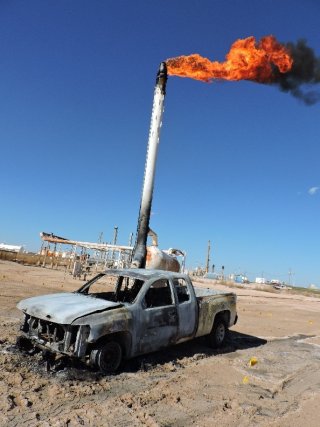
requires West Texas Gas to engage in comprehensive compliance reviews, including a third-party audit of its eight natural gas processing plants in Texas and New Mexico, for compliance with Section 112(r)(7) of the CAA and engaging in a review and third-party audit of the company’s Environmental Management System. These plants use a range of toxic substances in their processing methods including flammable hydrocarbons such as butane, methane, and propane. West Texas Gas will pay a $3 million civil penalty to resolve claims stemming from fatal chemical accidents and accident prevention program violations.
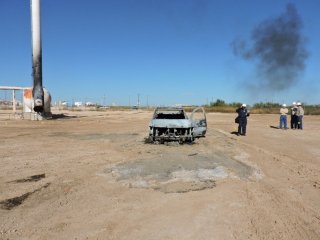
More information: https://www.epa.gov/newsreleases/west-texas-gas-companies-agree-pay-3-million-civil-penalty-federal-settlement
PSCo’s Comanche
On May 20, 2022, EPA and the Public Service Company of Colorado (“PSCo”) finalized a first-of-its-kind settlement under EPA’s Coal Combustion Residuals (CCR) regulations to resolve violations at PSCo’s Comanche power station in Pueblo, Colorado. The settlement addresses the large industrial waste stream volumes created from the burning coal in coal-fired power plants. CCR contains harmful levels of contaminants like mercury, cadmium, and arsenic. Without proper management, CCR contaminants can pollute waterways, groundwater, drinking water, and the air. Under this settlement, PSCo commits to address groundwater contamination issues, to ensure the proper closure of CCR surface impoundments under RCRA and comply with CCR regulations. Additionally, they will pay a civil penalty of $925,000.
More information: https://www.epa.gov/newsreleases/epa-reaches-settlement-public-service-company-colorado-over-allegations-noncompliance
UST Media
On November 11, 2021, EPA HQ and Regions 4, 5, and 8 finalized a settlement with US Technology Media (UST Media) for RCRA violations at UST Media’s facilities in Georgia, Ohio, and Utah. The RCRA violations included improper management and storage of hazardous waste without a RCRA permit. UST Media generated a spent blast media (SBM) that is toxic for cadmium, chromium, and lead and accumulated it at all three of UST Media’s facilities. As part of this settlement, UST Media will cease receipt of SBM at all facilities until the company disposes of the 3.4 million pounds of this material currently on site in compliance with the Consent Agreement. UST Media will pay a $200,000 civil penalty. If UST Media chooses to accept hazardous SBM in the future, after addressing the existing waste on site, it must be in compliance with all applicable hazardous waste laws.
More information: https://www.epa.gov/newsreleases/epa-settlement-resolves-hazardous-waste-violations-us-technology-media-inc-georgia
Toa Alta
On May 3, 2022, EPA and DOJ filed an interim settlement with Asphalt Solutions Toa Alta, LLC requiring the Municipality of Toa Alta, located in Puerto Rico, to address urgent
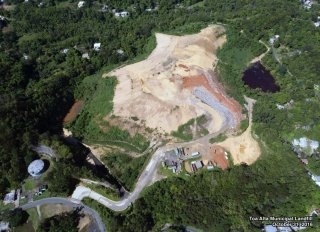
human health and environmental concerns at the Toa Alta landfill. The order reflected input that EPA and DOJ sought from the affected communities and will require the Municipality to take several immediate actions to address the concerns, including requiring Toa Alta to stop receiving waste, cover exposed areas of the landfill, and put plans into place to manage stormwater and leachate (contaminated liquid flowing from the landfill).
More information: https://www.epa.gov/newsreleases/settlement-order-filed-federal-court-will-address-serious-issues-toa-alta-landfill
North Slope Borough of Alaska
On June 9, 2022, EPA and DOJ finalized a settlement with the North Slope Borough of Alaska (Borough) to resolve violations of the RCRA and CWA. The Borough improperly stored numerous
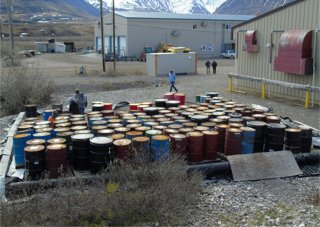
drums of solid and hazardous waste outside, which were accessible to residents and exposed to the environment. Additionally, the violations contributed to at least two oil spills into wetlands near the Kasegaluk Lagoon, Kaktovik Lagoon, and Pipsuk Bight. Oil spills in this sensitive arctic tundra habitat can harm fish and other wildlife as well as downstream waters, which are important to Native Alaskans, including for subsistence hunting, fishing, and gathering. The settlement requires the Borough to take comprehensive actions and make infrastructure investments to comply with solid and hazardous waste management rules and oil spill prevention rules. The Borough will also hire an independent third-party auditor to ensure that the compliance requirements in the settlement are successfully implemented and pay a civil penalty of $6.5 million.
More information: https://www.epa.gov/newsreleases/epa-and-justice-department-propose-settlement-resolve-federal-hazardous-waste-and-oil
Enforcement Settlements to Resolve Municipal CWA Violations
In FY 2022 as part of its core Clean Water Act enforcement program, EPA addressed alleged CWA violations via administrative and judicial settlements at various municipalities across the nation, such as Bucks County, Pennsylvania, and the Hampton Roads Sanitation District in Virginia. Some of the settlements addressed CWA violations in overburdened communities, such as Fall River, Massachusetts and East Saint Louis, Illinois. These enforcement orders involved CWA violations such as combined sewer overflows and sanitary sewer overflows – typically in the form of untreated or partially treated wastewater discharging from outfalls or overflowing from manholes. These types of overflows constitute unauthorized discharges of pollutants into waterways and pose a substantial risk to public health and the environment. The main pollutants in raw sewage from overflows are:
- bacteria;
- pathogens;
- nutrients;
- untreated industrial wastes;
- toxic pollutants, such as oil and pesticides; and
- wastewater solids and debris.
These settlements result in residents having cleaner, safer water and healthier waterways in their community.
